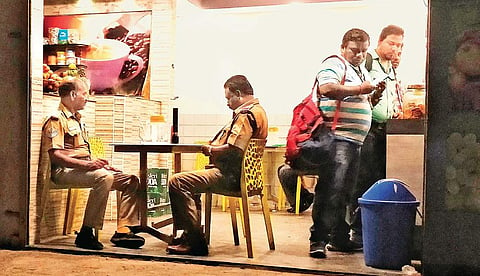

CHENNAI: Ever since the 9-to-5 job became an exception and not the norm, there has been a debate about whether shops in the city should be allowed to operate round-the -clock to cater for a sub-society that has started sleeping and waking up at odd hours.
On Monday, a public interest litigation petition questioning the legality of police forcing shops to close by 11 pm came up for hearing before the first bench of the Madras High Court.
The petitioner alleged that neither the Tamil Nadu Catering Establishment Act nor the Tamil Nadu Shops and Establishment Act had mentioned timings within which shops should operate. He also brought to the fore a government order No 53, dated March 22, 2017, which states that shops would be allowed to remain open 365 days a year. The petitioner argued that a day is a 24-hour-long event and police asking traders to down shutters is a violation of the government order.
The first bench of the Madras High Court has scheduled the hearing for Friday.
While the outcome of this PIL could settle the debate whether shops should be given the choice of operating when they want, the police expressed concerns over the law and order problems that could arise if Chennai suddenly became a city that never sleeps.
“Chennai just isn’t there yet,” said a top police officer, expressing concerns over resources to effectively ensure safety of citizens round-the-clock. He, however, said police let shops operate till 12 am, not 11 pm.
But he did not elaborate under what sections of law, ‘violators’ are booked under for keeping shops open past the 11-pm ‘curfew’ which has come into effect over time.
Jayaram Venkatesan, a civic activist, expressed concerns over the ‘less people on roads, less crime’ mentality adopted by the police. “What study has been done to show taking people off roads can reduce crime,” he argued, deeming the curfew a “means to get bribes from shops”.
On Tuesday night, two middle-aged cops entered a juice shop near Sholinganallur a few minutes after midnight. They ordered two fig milkshakes. One of the cops quickly flashed his torch on the cashier before stepping out with two parcels.
Promptly the lights of the shop went off and the shutter came down halfway as the cops left the building on a motorcycle without a helmet apparently without paying. “They never do,” claimed the cashier, explaining how in addition to freebies, they have to pay `500 every day to keep the shop open past 11 pm.
The shop caters for the IT hub nearby and fresh batch of workers on their way home arrive at 12:30 am. “We somehow make a profit but have to grease the cops,” said the cashier.
However, this is not an isolated incident.
Justus Jamieson, an IT professional from the city, has witnessed arrests of shopkeepers and even customers near Ambit IT Park in Ambattur Industrial Estate for visiting shops past 11 pm.
Being a regular to late night eateries, he explains how sometimes, despite taking bribes, cops still make arrests and file cases.
This reporter witnessed a few months ago how students from a private college in Tambaram were loaded onto police vans from a tea-stall along the Velachery Main Road. Their crime — ordering tea and fresh juice. When one student questioned why they were being detained, the police pushed him into the van.
The shopkeeper revealed how every day, a few unlucky students are taken to the nearby police station for questioning and to show accounts for night patrols.
“They are easy victims,” he said, confessing to paying bribes to keep his shop open through the night to cater to college students.
Express found how even tea-sellers on cycles, the only respite to many weary travellers, have to grease the palms of officials to operate. While they are charged less than the juice shops, they allege that cops take cigarettes. “If we refuse to pay, they file a public nuisance case against us,” he said.